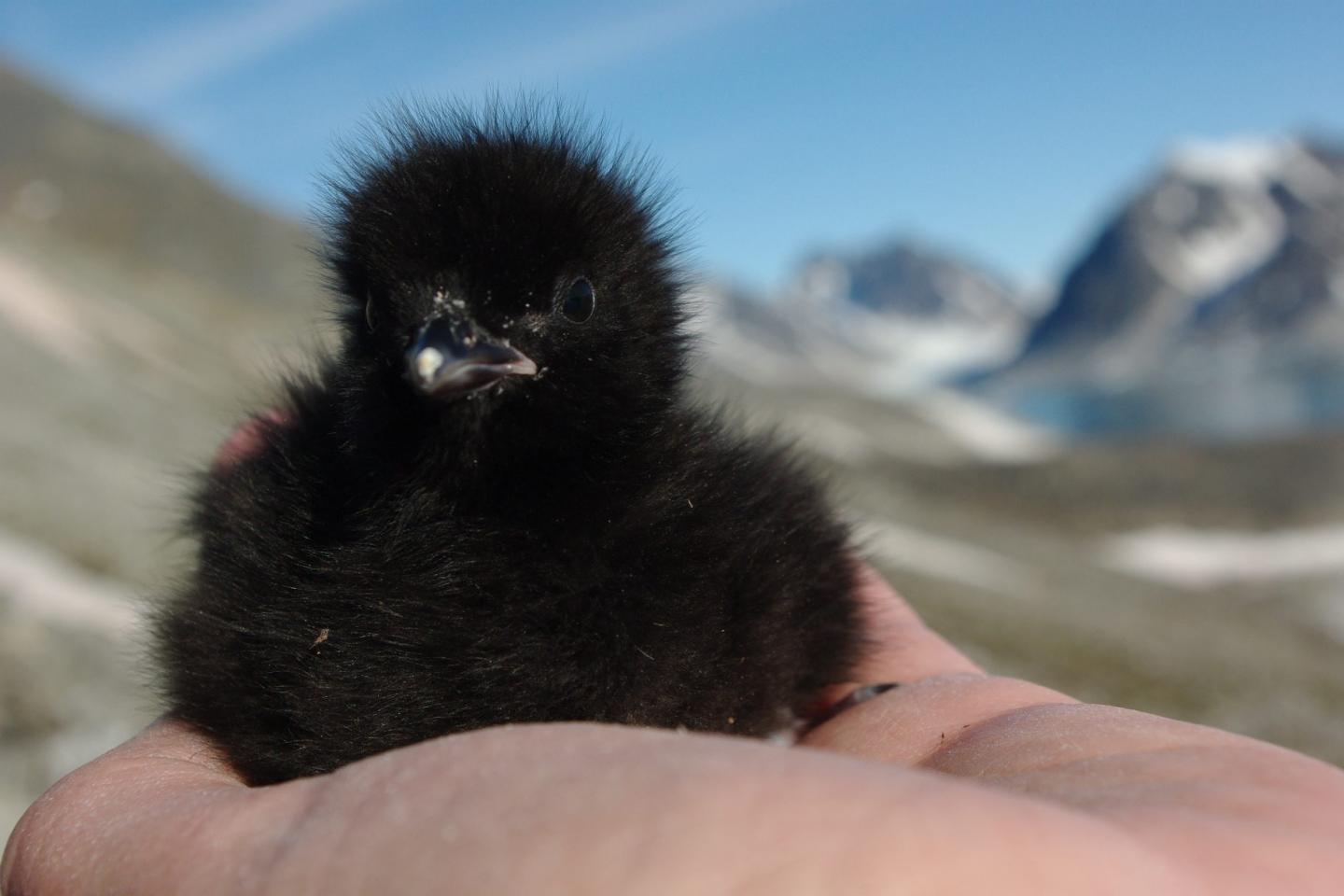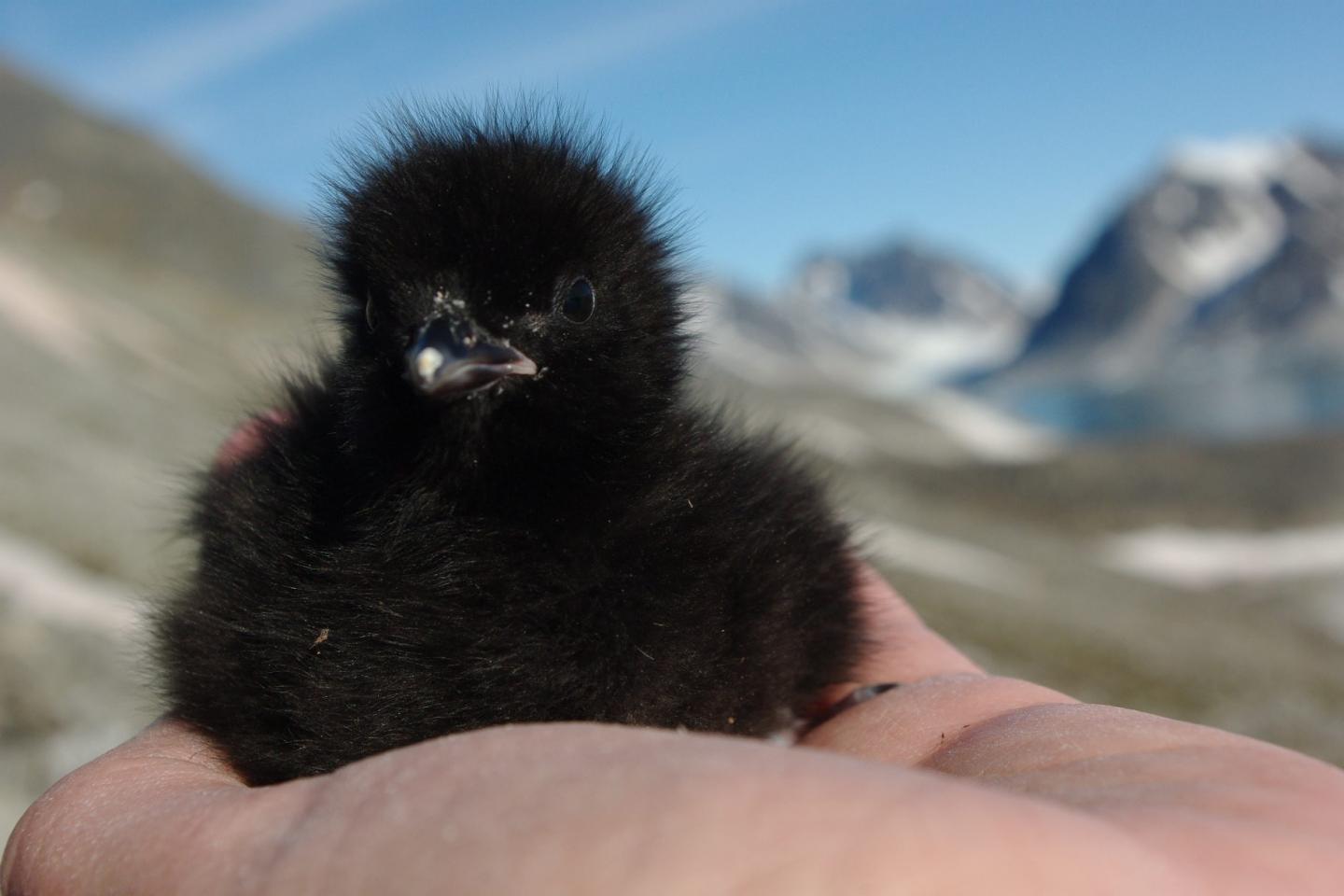
Credit: Dorota Kidawa
Stress is a factor not only in the best human families; it also appears among animals. To see how bird family members interact with each other in stressful situations, researchers from Vetmeduni Vienna and the University of Gdansk, Poland, studied parent-offspring interactions in a long-lived seabird, the little auk (Alle alle). The scientists gave parent and offspring birds a hormone pellet to increase their "stress levels", with the result that stressed offspring not only intensified their begging but also received more food than "relaxed" chicks. Nevertheless, increased begging was not the determining factor of the parent-offspring interaction. When parent birds were stressed, they automatically reduced offspring feeding and spent more time searching for food for themselves. The parent-offspring interaction among little auks therefore clearly depended on the state of the adult bird, even though little auks usually raise only a single chick. The results have been published in the Journal of Ornithology.
Little auks (Alle alle) breed in large colonies on rocky cliffsides in arctic regions. These seabirds live in a harsh environment and often face stress in the form of food shortages and poor weather conditions. But this isn't the only thing that makes them so suitable to study stress-induced behavioural mechanisms. They also are of interest for their long lifespan and because little auks raise only a single chick during the year, which excludes sibling rivalry as a factor in stress studies. A team of researchers from Vetmeduni Vienna and the University of Gdansk in Poland thus attained informative insights into the interaction between long-lived birds and their offspring.
Stress behaviour in birds controlled by hormones
"Birds respond to stressful situations by releasing the hormone corticosterone," explains senior author Rupert Palme from the Department of Physiology, Pathophysiology and Experimental Endocrinology at Vetmeduni Vienna. This makes corticosterone an important stress indicator in behavioural studies. Hormone pellets can be used to artificially release corticosterone into the birds' bloodstream in order to observe the animals' behaviour under stress. The pellets have the advantage that corticosterone is released in a controlled fashion continuously over a certain period of time. An analysis of faecal samples can be used to show that the additional hormone was metabolised by the body. The internationally recognised method of measuring faecal hormone metabolites was developed by senior author Palme.
To analyse the mechanisms controlling familiar interactions among little auks, the researchers first implanted offspring birds, then parents with hormone-releasing pellets. Chick behaviour was analysed using acoustic recordings, that of the parents by looking at feeding intervals and time spent away from the nest or colony.
Little auk offspring come in second place
Nestlings responded to the artificially heightened stress levels by increasing their begging performance. "More food means more reserves, better fitness and, therefore, a higher chance of survival," says first author Dorota Kidawa from the University of Gdansk, Poland. "The intensified begging behaviour was a cry for help directed at the parent birds that was clearly successful." The stressed offspring weighed more than the control chicks, which indicates that they had been fed more frequently by the parent birds. "Our study shows that adult little auks usually go to their limit, to their caring maximum, in order to give their offspring enough to eat," says Palme.
The second test, however, in which the researchers implanted a hormone pellet into one of the parent birds, showed that this limit depends on the stress level of the parent bird and not on the begging behaviour of the young little auks. Under stress, parent birds alter their behaviour to their own benefit. They left the nest for longer periods of time to provide more food for themselves. As a result, they fed their young less frequently and the physical state of the offspring worsened considerably compared to the control group.
Despite egoistic survival instinct, the birds are not bad parents
"The begging behaviour elicited a care response among the adult little auks. But this response, and its extent, depend on how fit the parent birds feel," says Palme. If their own chance of survival is reduced because of a food shortage or weather conditions, they will focus more on themselves and spend more time looking for their own food than on the care of their only chick. "But that doesn't make them bad parents," says Palme. "This is a normal occurrence in nature that cannot be compared to our behaviour and sense of responsibility." For the long-lived little auks, it is more important to secure their own existence, to survive another year and to raise another offspring in the future. After all, poor food conditions and environmental factors can also reduce the young birds' chance of survival.
###
Service: The article "Parent-offspring interactions in a long-lived seabird, the Little Auk (Alle alle): begging and provisioning under simulated stress" by D. Kidawa, M. Barcikowski and R. Palme was published in Journal of Ornithology. DOI: 10.1007/s10336-016-1382-y http://link.springer.com/article/10.1007%2Fs10336-016-1382-y
About the University of Veterinary Medicine, Vienna
The University of Veterinary Medicine, Vienna in Austria is one of the leading academic and research institutions in the field of Veterinary Sciences in Europe. About 1,300 employees and 2,300 students work on the campus in the north of Vienna which also houses five university clinics and various research sites. Outside of Vienna the university operates Teaching and Research Farms. http://www.vetmeduni.ac.at
Scientific Contact:
Rupert Palme
Unit of Physiology, Pathophysiology, and Experimental Endocrinology
University of Veterinary Medicine Vienna (Vetmeduni Vienna)
T +43 1 25077-4103
[email protected]
and
Dorota Kidawa
University of Gdansk, Poland
[email protected]
Released by:
Georg Mair
Science Communication / Corporate Communications
University of Veterinary Medicine Vienna (Vetmeduni Vienna)
T +43 1 25077-1165
[email protected]
Media Contact
Rupert Palme
[email protected]
43-125-077-4103
http://www.vetmeduni.ac.at





